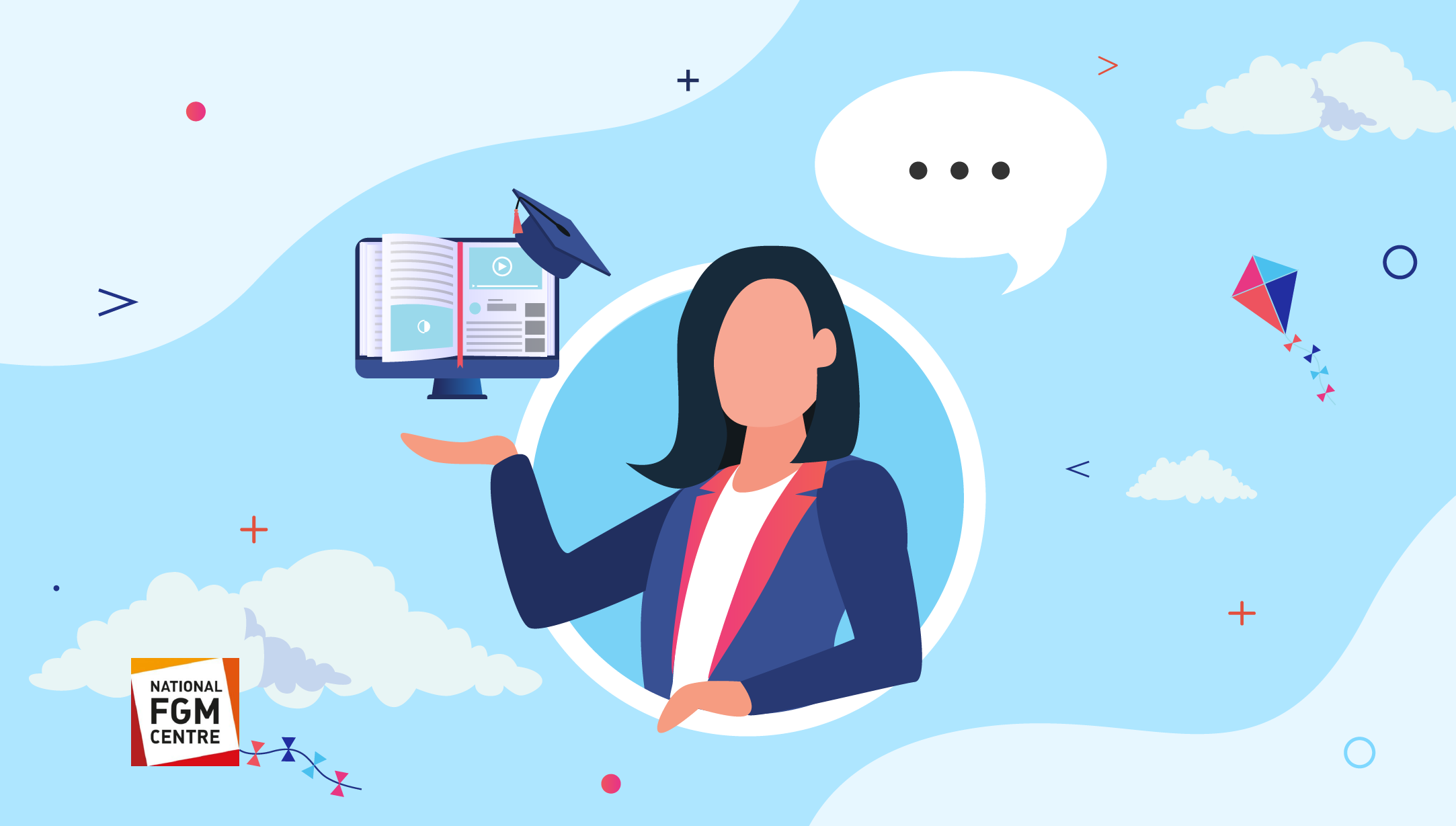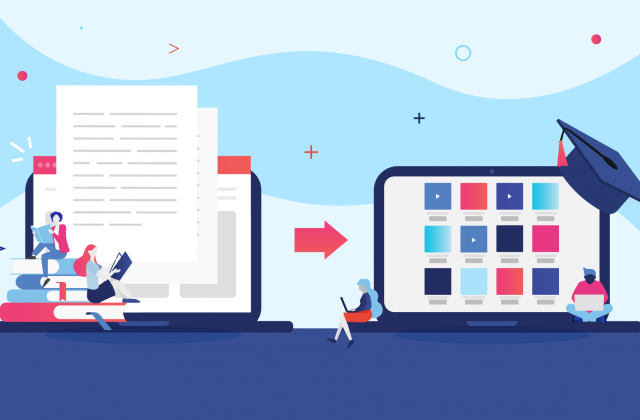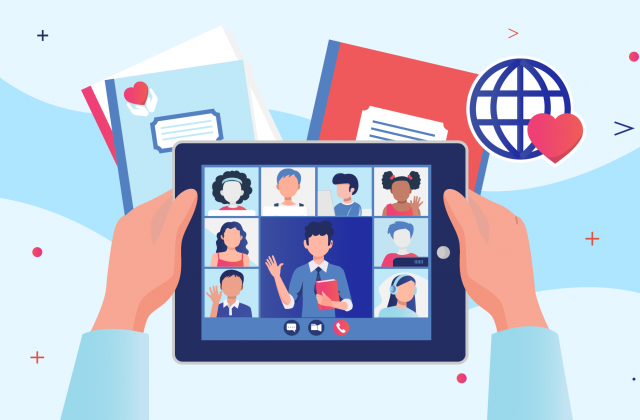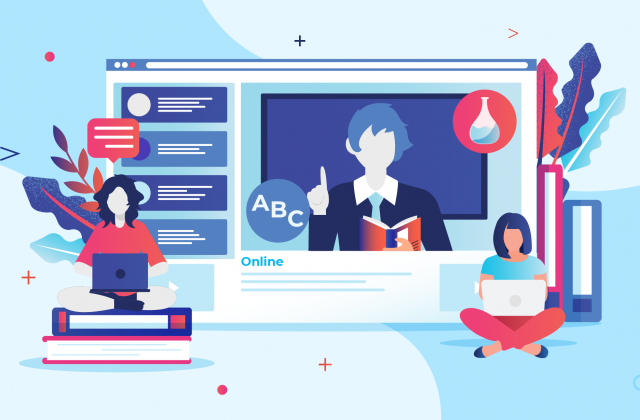With everything going on in the world at the moment with the pandemic, it can be easy to forget that there are issues that need to be addressed and worked on every single day, no matter how challenging circumstances may be. One of these issues needing to be addressed is preventing and eradicating harmful practices; which is exactly what the National FGM Centre is working on every single day without fail.
The National FGM Centre is a partnership between Barnardo’s and the Local Government association. They work closely with key partners from local authorities, police, education, health and the voluntary sector to keep children and young people safe from female genital mutilation (FGM) and other harmful practices, such as breast flattening and child abuse linked to faith or belief.
In order to improve their reach and their cooperation with different agencies and organisations, the National FGM Centre decided to implement an eLearning tool. We have joined forces and created the first of its kind Harmful Practices eLearning tool that will help the National FGM Centre reach their goals in a more holistic way.
eLearning tool for the win
Discussing and learning about FGM and other harmful practices requires time and patience. It is not something that can be done in haste, especially given the sensitivity of the topic.
Thanks to the eLearning tool, agencies and organisations working with individuals and communities affected by harmful practices can take advantage of self-paced learning. In addition to this, after each learning phase, there is a quiz that can help them check their understanding of the provided learning materials.
In order to check how FGM eLearning has helped the National FGM Centre and to find out more about their future plans, we have reached out to Rohma Ullah from the National FGM Centre.
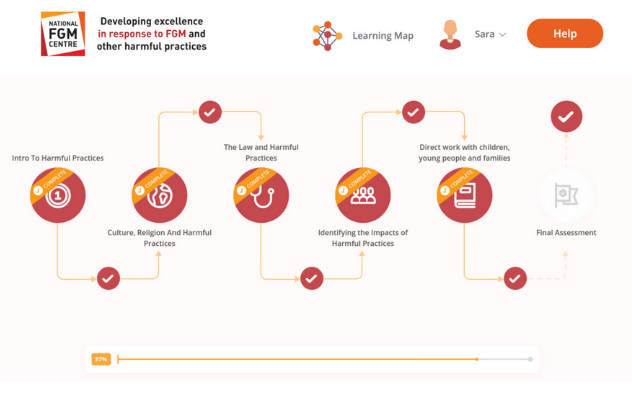
ED: The Barnardo’s National FGM Centre are fighting every day to allow girls to grow up without being harmed. What are the most significant changes you’ve noticed since you’ve begun your journey to root out female genital mutilation?
Harmful practices, such as FGM, can sometimes be very complex issues to navigate, and the Centre, in partnership with the Local Government Association, has been working for years with tens of thousands of professionals to empower them to normalise the topic in child protection, and to treat it as any other safeguarding issue that may present in a family they are working with.
We understand that for some professionals working on these issues may bring about anxieties, and our work, for example in training and professional development, is to empower and to increase their confidence to effectively safeguard any child or adult who may be affected by harmful practices. We are incredibly proud that 100% of professionals that we have trained have reported their confidence to work on cases improved after working with us, but know we have a lot more work to do.
We are also incredibly proud to be recognised as international experts in harmful practices. Not only are we experts in FGM, we are a leading organisation which provides training and expert consultancy on child abuse linked to faith and belief.
Although we work nationally, we have international reach and aspirations, and have been visited by experts and professionals from across Europe, America, Africa and Australia, all to share reciprocal learning. We pride ourselves on being enablers of learning – not only on the grassroots but across influencing governments and statutory bodies, by being called on to influence policy, provide expert consultancy on law, and expert advice in high risk cases across the UK and internationally; all in the hopes of giving girls and women a voice, and shaping the lives of children now and in the future.
One of our greatest achievements of the Centre was in the development of the only automatic Risk Assessment tools for social workers in the assessment of FGM cases – a tool which automatically calculates risk for you, dependent on the information you give it. This tool revolutionised the assessment of cases in the social work field, won an award in the use of digital technology in safeguarding, and went on to be adopted by local authorities and police forces across the UK, and is currently being considered for adaptation internationally.
Whilst we have accomplished so much, and seen so much change in the sector since our establishment in 2015, we know there is so much more to do for children and their families, and is the reason why we won’t stop.
ED: You’ve never shied away from hard work and implementing new and modern ways to help you in your fight. How did you come up with the idea of using FGM eLearning to improve knowledge and skills of multi-agency professionals?
The Centre was established as an innovation programme by the Department for Education in 2015, so innovation is at the core of our ethos, as are the children and families we are looking to protect and support. Hand in hand, we are looking to provide services in innovative ways that protect the most vulnerable. We are constantly looking at and reflecting on the types of cases we are seeing come through the front line, looking at patterns, gaps in service provision, and ultimately how we can fill these gaps.
Being a Centre of innovation, this means we don’t want to do things the ‘regular’ way – we want to explore new ways of doing things that haven’t been done before (but using evidence base of course). This is also how we developed the idea of the FGM Risk Assessment Tool – by firstly asking, how can we enable practitioners to assess risk more confidently, and ask the right questions? How can we do this innovatively? What if risk was automatically calculated for them, but they used their skills to analyse this? And with that, was born the FGM Risk Assessment Tool.
With the eLearning, we went through a similar process. How can we get more professionals to understand harmful practices holistically? How can we reach more professionals without taking them out of their offices? How can we do this innovatively? And with that, was born the Harmful Practices eLearning.
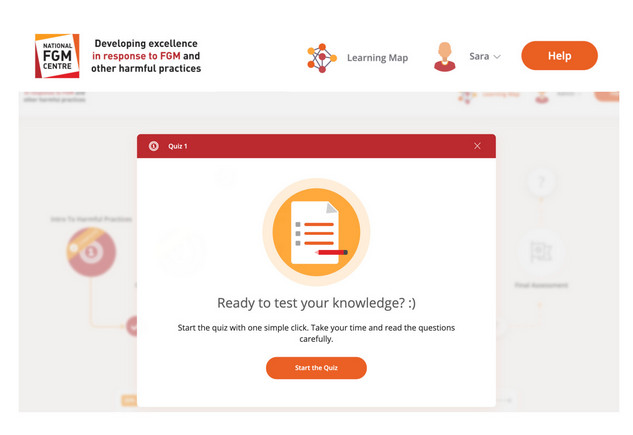
ED: Your Harmful Practices eLearning tool is the first of its kind in the world. Was it a challenge to come up with adequate content for it and to know what should be included and what should not?
The National FGM Centre is made up of a team of experts who know the subject matter incredibly well, and the core writing team was small, so it was relatively easy to identify what material we did and did not want to include in the eLearning. It has been a dream of ours to develop this platform for quite some time, so we had been collating content for quite some time!
On reflection and looking back however, developing the eLearning did give us great insight into the level of confusing, and sometimes inaccurate content that exists regarding harmful practices. Professionals can be assured that any content we have included in the eLearning is quality assured by our team and a range of other experts.
ED: What do you like the most about using the eLearning for health tools for education of professionals?
One of the greatest advantages of using an eLearning platform for educating professionals, particularly on a specialist subject matter, is the fact that you can reach a larger number of professionals than you would ordinarily be able to in a face-to-face setting, and it’s one of the reasons we have wanted to develop it for so long.
We wanted to be able to offer professionals a range of options to choose from to suit their learning styles and needs.
For some, the classroom is not suitable, and perhaps learning from an office, or even home is a preference, or vice versa.
ED: In what ways did FGM eLearning transform the more traditional methods of knowledge-sharing and training?
The eLearning, for us, certainly ticks the box of blended-learning. A learner can choose to learn when they want, how they want, and within their own time; meaning it doesn’t take an individual away from the office for a day, for them to return to a backlog of emails – something we know is a great pressure for many professionals across the country.
The eLearning also includes varied content – from theory provided by text, to content we filmed with world renowned experts in the field, to case studies performed by live actors, and answers given by leading experts like our Head of Centre, to quizzes and tests, with no classroom pressure to pass under any time limit.
The eLearning really allows a user to put learning back in their hands, and reflect on what they still need to learn once they have completed it, to then reach out to us and get that support.
ED: Did Harmful Practices eLearning tool fulfil your expectations?
Absolutely. At the Centre, we are striving to do better everyday to improve the lives of the most vulnerable children, and whilst our expectations were absolutely fulfilled we will always be looking to improve it in the future.
ED: What are your plans for the future? Do you intend on incorporating more interactive learning and training options, which proved to be essential with COVID-19 pandemic?
Being a Centre of innovation, we have big aspirations, goals and plans for the future, all intended to improve the lives of children and families affected by harmful practices, particularly as we know that COVID-19 has exacerbated risk and the protections available. One of these is to build on interactive digital content which is community based. Watch this space!
ED: How were you satisfied with collaboration with the development team? They had an opportunity to learn about this important topic more, have you had an opportunity to learn something from them as well?
Eton Digital team has been an incredible partner to collaborate with, and we couldn’t recommend them enough! Our work of course will never be done until every person in the world knows about harmful practices, and to hear how interested Eton was in our mission from the outset made the collaboration feel right, and has been the reason for such a successful end product. We are of course about reciprocal learning and have learnt greatly about what it takes to develop such a platform – and of course, about the Serbian mountains along the way!
Eton’s ability to take on board and incorporate even the most minute details are what have impressed us the most, along with their willingness to help wherever possible and when we have had a query, in such short spaces of time. Apart from each of the development teams genuine kindness, and professionalism, we do have to say a special thanks to Damjan Gataric, for making our vision come alive.
We really look forward to working with the team again in the future and consider them honorary members of the National FGM Centre!
We at Eton Digital are grateful that we’ve had an opportunity to work on such an important and valuable project such as FGM eLearning that can truly make a difference and improve the lives of many children and young people not just in the UK, but across the world as well.
If you are interested in finding out more about the Harmful Practices eLearning tool, listen to their podcast.
Explore our elearning for health projects and if you have an idea, we would be happy to share our elearning platform development experience with you.
Get a free quote today and we’ll help you launch your product!

